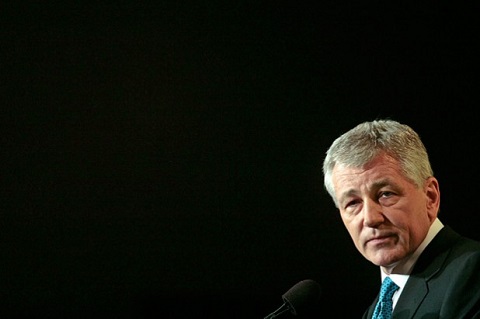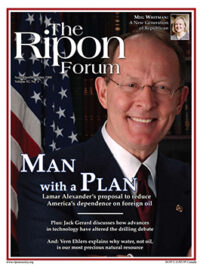Elections are about course corrections, and Americans are in a serious mood to change the direction of their country. According to a recent Washington Post-ABC Poll, eighty-four percent of Americans believe America is headed in the wrong direction. Gallup says it’s eighty-three percent. These are historic numbers, and they register the depth of discontent with the current policies, leadership, and politics of our country. I believe what awaits the next President is an inventory of problems more complicated than what Franklin Roosevelt faced on March 4, 1933, and will require the same boldness of leadership and initiatives that FDR brought to his time.

The great challenges facing mankind in this new century are not unique to nations, regions, religions, or cultures. All citizens of the world must confront the threats of nuclear proliferation, terrorism, pandemic health issues, endemic poverty, environmental degradation, and the most insidious and difficult of all, despair. These are Twenty First century challenges that will require Twenty First century thinking within a Twenty First century frame of reference. History instructs and is a guide, but it cannot navigate our way, develop our strategy, or implement our policy. The rate and intensity of change today in a world of less and less margin of error has brought with it an unprecedented immediacy to actions, reactions, and consequences. But wise leadership exercising wise judgment that results in wise policy is never outdated.
I believe America is in trouble.
I believe America is in trouble. The next president’s challenge will be to fix problems and make a better world. That’s what defines leadership.
America’s competitive position and strength in the world demands that we address the domestic challenges that are eroding our economic strength and consuming our government budgets. Our next President will be faced with a long list of important issues that touch every American and will require serious reform, such as: entitlement programs (Social Security, Medicare, and Medicaid); tax and regulatory systems; public infrastructure; health care; and immigration.
Our national debt, and its rate of accumulation of deficits, is not sustainable. If this continues, America’s debt burden will crush our children’s future.
Economic strength is the foundational base that determines our ability to project and use all of our instruments of power, including diplomatic and military power. Trade, however, is not a guarantee. The ongoing credit crisis and skyrocketing world food and energy prices are among the recent temptations for countries to restrict markets and veer toward protectionism that leads to dangerous insular thinking. These temptations must be resisted and the hard-earned lessons of history not forgotten.
… today, much of the world has lost its trust and confidence in our purpose and questions our intentions.
Energy drives prosperity in the world and is a principal determinant of our economic welfare. There is no near-term substitute for oil, natural gas, and coal. But our next president needs to initiate policies that will eventually break our long-term reliance on oil. This includes more investment, research and focus on technology, alternative and renewable sources of energy (particularly nuclear energy), conservation, mass transit, and seriously improving our mileage standards.
Our infrastructure is in a state of crisis. As Kansas City Mayor Mark Funkhouser stressed when he told the Senate Banking Committee in June, “We are witnessing a quiet collapse of prosperity.” Morgan Stanley has projected that emerging economies will spend $22 trillion on infrastructure over the next ten years. Like our workforce, our nation’s infrastructure is aging and will require new initiatives like the bill that Senator Chris Dodd and I have introduced to create a National Infrastructure Bank that would allow private investment to finance public infrastructure projects.
As America is working its way through its most pressing issues, we continue to spend billions of dollars a week stuck in Iraq and Afghanistan.
We cannot escape the reality that Iraq and Afghanistan will remain centers of gravity for U.S. foreign policy. Yet, our ability to influence and shape outcomes will be measured by the larger and longer term objectives of common interests in all areas of our security — not just in those two countries. The success of our policies and efforts will depend not only on the extent of our power, the strength of our purpose, and cohesion of regional alliances, but also by an appreciation of great power limits.
America’s long-term security interests are directly connected to alliances, coalitions, international institutions and our standing in the world. No country, including the United States, is capable of successfully meeting the challenges of the Twenty First century alone, whether it is terrorism, economic growth, climate change or nuclear proliferation. Yet today, much of the world has lost its trust and confidence in our purpose and questions our intentions. The next President will have to reintroduce America to the world in order to regain its trust in our purpose as well as our power.
International institutions are more important now than at any time in modern history. Our post-World War Two alliances and partnerships, particularly with the European Union, Australia, Japan, South Korea and Turkey, must be strengthened and recalibrated to recognize that these powers are no longer American Twentieth century surrogate powers expected to automatically do our bidding or agree with our positions. Our relationships with these nations and others have matured bringing more equality and balance to the relationships. Working through international institutions and alliances to build broad, diplomatic consensus may be difficult, time-consuming, and frustrating but they are the best options…and smartest approaches to sustainable and effective strategic outcomes. The alternative of unilateral action is no substitute.
We are currently in a strategic cul-de-sac in the Middle East. We need to find our way our with new policies.
Nuclear proliferation will require special attention by the next President. Today’s post-Cold War nuclear nonproliferation framework has become inadequate as more states seek nuclear capacity, and nuclear know-how is becoming increasingly more accessible. The world must build a new Twenty First century nuclear nonproliferation and disarmament framework…and the United States, Russia, China, India, and the European nuclear powers must lead this effort.
The United State must pay particular attention to three key relationships – China, India and Russia. America’s relationships with each of these three countries will continue to be comprehensive, including areas of agreement and disagreement. We cannot, however, allow these relationships to be dominated and shaped by our differences…or we risk creating dynamics that can quickly get beyond our control and move down a dangerous and irreversible path. We must define these relationships on our common interests.
The Middle East today is more dangerous, more complicated, more interconnected, and more combustible than ever before. Regional, comprehensive strategies – rather than individual nation-by-nation compartmentalized policies – will be required in this troubled region. As one of his most immediate priorities, the next President will need to implement a comprehensive geostrategic approach to the broader Middle East region spanning North Africa to Afghanistan and Pakistan. This will require employing all of our instruments of power – diplomacy, trade, exchange and economic assistance programs, alliances, intelligence, and military might.
We are engaged in a war of ideas and ideologies to win over the youth of this region. Classrooms are the battlefields. This will require a revolutionary universe of new thinking and policies. The human dynamic always dictates outcomes.
The United States must enhance its initiative in support of Israel-Palestinian negotiations. We should make clear our support for direct Israel-Syria and Israel-Lebanon negotiations and be prepared, at the right time, if asked, to become directly involved, including as a sponsor. We should take the initiative to reengage Syria by returning the U.S. Ambassador to Damascus. The United States should open a new strategic direction in U.S.-Iran relations by seeking direct, comprehensive and unconditional talks with the Government of Iran, including opening a U.S. Interest Section in Tehran. We must avoid backing ourselves into a military conflict with Iran. We are currently in a strategic cul-de-sac in the Middle East. We need to find our way out with new policies. Engagement is not appeasement. Diplomacy is not appeasement. Great nations engage. Powerful nations must be the adults in world affairs. Anything less will result in disastrous, useless, preventable global conflict.
America’s occupation of Iraq and Afghanistan is not a ‘win-lose’ proposition. That is an inaccurate context for our objectives and policies. Stability, security, prosperity and peace are the objectives. That is the appropriate context. There will not be a military victory in these conflicts. As General David Petraeus stated in a recent Senate Foreign Relations Committee hearing, there is no military solution in Iraq. The outcome in Iraq and Afghanistan will be decided by the people of these nations, and that outcome will be much influenced by their neighbors. Iran, Pakistan and Saudi Arabia are the three most critical nations in this equation.
The leaders of Iraq need to find a common ground of political accommodation preparing for political reconciliation to govern their country and assume responsibility for the security and prosperity of its people. As CSIS President and former Deputy Secretary of Defense Dr. John Hamre has written, “Iraqis genuinely want us to leave, and the only issue in question is when and how quickly…what we now need is realism about Iraq. We haven’t failed, but winning won’t fit any traditional definition of success.”
The next President will need to pursue a responsible phased troop withdrawal from Iraq that will slowly, steadily but surely bring to an end the U.S. occupation of Iraq.
America’s way out of Iraq will require a regional diplomatic strategy that includes a sustained and disciplined American engagement with all of Iraq’s neighbors, notably Iran and Syria, as well as the international community. This would also include a regional security conference supported by key international institutions. Our goal should be to build a constructive regional and security framework supported by the international community to help the Iraqis achieve a core of political stability. It is up to the Iraqis how they will shape their government and build their country.
While Afghanistan’s future remains uncertain, the success of the Paris donor’s conference earlier this summer – where more than $20 billion, including $10 billion from the United States, was pledged to assist Afghanistan – could be a foundation to build a new international strategic priority on Afghanistan. We need to emphasize institution building, including increased budgetary assistance and vigorous anti-corruption programs. More effective and integrated international coordination, preferably through the UN Special Envoy and working from the Afghan Government’s priorities, should be central to our overall approach.
Strong and capable Afghan security forces will be the only sustainable solution for Afghanistan’s stability. That must be our strategic objective. Until that is achieved, international forces are needed in Afghanistan… but we must be careful about the U.S. and NATO military footprint in Afghanistan. We need more troops to prevent security vacuums from emerging, as we witnessed in the southern province of Kandahar earlier this year. But we also need more effective NATO capacity, some of which remains constrained by national restrictions on the rules of engagement, known as “national caveats.”
Another challenge that awaits the new President is the human condition of the world’s impoverished populations. While the last sixty years brought unparalleled progress and prosperity for America and many parts of the world, it is equally true that there are billions of people who have been left behind. The impoverished regions of the world are the most unstable, volatile, and dangerous areas representing the greatest threats to America and the world. Extremism and terrorism breed in these locations. Therefore, we must pay attention to them. RF
Chuck Hagel is retiring as the senior Senator from Nebraska.




